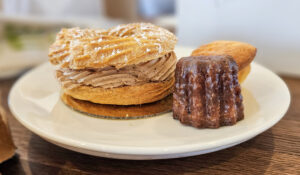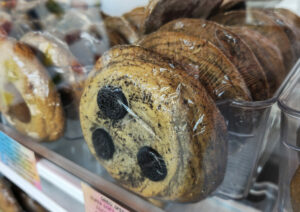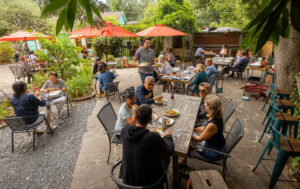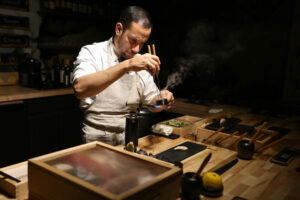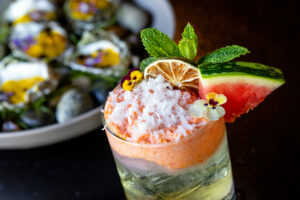 It’s hard to appreciate a great tortilla until you actually eat one. And chances are you’ve never eaten one.
It’s hard to appreciate a great tortilla until you actually eat one. And chances are you’ve never eaten one.
Sadly, most of the tortillas we consume are about as fresh and wholesome as gooey white bread — meaning not exactly the stuff that Mexican grandmothers were grinding by hand each day and serving fresh each meal. A culinary staple and nutritional cornerstone, they’re essential to the Latin American food lexicon, but sometimes overcomplicated. Corn tortillas, the most authentic of Latin American tortillas, should contain exactly three ingredients: Corn, lime (calcium hydroxide) and water. Flour tortillas usually have five: Flour, baking powder, water, salt and lard. But even the best ingredients can’t mask the fact that excellent tortillas are made fresh each day, rather than sitting for days (or weeks) in a refrigerator. It’s sort of like eating a stale baguette — it’s still a baguette, but the magic is gone.
One of the most passionate advocates for the iconic corn tortilla, used most frequently for tacos, taquitos, gorditas and of course, corn chips, is Karen Waikiki, The founder of Primavera Tamales and recently opened El Molino Central (11 Central Ave, Boyes Hot Springs) is renowned for revitalizing traditional methods of stone-grinding corn into masa, an art all but lost in Mexico. Each morning, around 11am, staff feed soaked corn — grown by a single farmer in Nebraska — into the specially-made grinding machine for the day’s tortillas and tamales. “No one is grinding corn anymore. People just stopped grinding corn and use instant ‘Maseca’ instead. But (grinding) is just the way it should be,” Karen said, hustling through her kitchen. A longtime friend of Mexican cooking authority Diana Kennedy and Alice Waters, she’s concerned with what she sees happening to the native tortilla.
Maseca is a readily-available prepared commercial cornmeal flour that is ubiquitous throughout Latin America, and has simplified tortilla preparation. But advocates of slower, more traditional culinary style bristle at its use — which is also predominant in the US. Waikiki said only a few tortillerias in California still stone grind their corn, which, in local hunts for stone-ground corn tortillas proved true. Most say they use Maseca for their tortillas.
Throughout the day, Karen and her staff use a wooden press to flatten the masa (or dough) and throw them on the grill at El Molino. Crispy, dense and intensely flavored, they’re the real deal. Fanatics can buy fresh masa for torillas for $1.25 or prepared tortillas for $3.50 a dozen. Realizing that her demographic is both the tony spa-set of the nearby Sonoma Mission Inn as well as the heavily Latino working-class population, she aims to entice both. “We want the local community to buy and like these,” Karen says, pointing to the irregular edges on her tortillas — a sign that they’re handmade rather than machine-made. “Otherwise, all this is just pointless,” she added.
At Central Market (42 Petaluma Blvd. North, Petaluma, 778-9900) Chef Tony Najiola is so enamored with Waikiki’s corn tortillas that he makes a pilgrimage to Sonoma each week to pick up a batch for his lengua tacos at Central Market. “They’re so good, with the soft tongue and corn tortillas that I’ve decided they’ll stay on the menu as long as we’re here,” he said.
Dearer to most Americans are flour tortillas, the ubiquitous wrapper of burritos and enchiladas. Because of it’s higher gluten content, flour tortillas can be stretched larger, making them idea for the two-pound super burritos that stretch the definition of actual Mexican cuisine. Flour tortillas are relatively new to Latin American culture, but have quickly become a mealtime staple, especially in Northern Mexico.
Flour tortillas are tastiest when made with lard (old-fashioned pig fat) crisping up and lending flavor, rather than just structural support to the meal. Most commercial tortilla manufacturers have abandoned this diet-unfriendly ingredient for more politically correct vegetable shortening or other oils. One of the best spots for fresh, warm flour tortillas is at Tortilleria Jalisco (897 W Napa St., Sonoma, 935-7356), where locals takeaway still-warm bags by the pound and swear by the posole. Run by a group of women, most mornings you can watch as they roll the dough and lineup stacks of balls for pressing and griddle-cooking. They’ll cost you just a few dollars for a stack of 10, in flour, wheat or spinach flavors. Jalisco also makes fresh corn tortillas with Maseca.
But Mexican-food lovers will tell you that the best place to find fresh tortillas is on Saturday and Sunday when the posole and menudo come out. Most good restaurants will make the effort to make fresh tortillas when their bread-and-butter customers (hint, not the burrito-crowd) come in for authentic eats. Local faves that usually have fresh tortillas on the menu include Antijos la Texanita, the new Don Pedro’s, housed in the former Pepe’s spot, 2000 Sebastopol Ave., Santa Rosa; Pupuseria Salvadorena (1403 Maple Ave., Santa Rosa) and El Malecon (217 Southwest Blvd., Rohnert Park, (707) 794-9047).
Also check out:
– Chevy’s Fresh Mex: Not everyone’s a fan of this national chain, but there’s no denying their hot, fresh flour tortillas. Kids love grabbing dough balls for a little pre-meal entertainment, and watching the tortilla machine is oddly fascinating for all ages. (24 4th Street, Santa Rosa, 571-1082)
– La Tortilla Factory Hand Made Style Corn Tortillas: It’s easy to get addicted to these tasty supermarket corn tortillas with a homemade taste. These irregularly-shaped tortillas (making them seem a bit more homemade) are a mix of corn and wheat, making them pliable and exceptionally tasty. Available at most supermarkets. La Tortilla factory also makes dried masa available for tortillas and tamales.
– Fresh Lard: Lard is less difficult to find than it used to be, but the key is getting really fresh, white lard. Fremont Diner sells containers of white lard (used for pie crusts) for $18.
Fresh corn and flour tortillas
Finding fresh, hot tortillas isn't that hard. But finding really good ones...well, that's another story.


